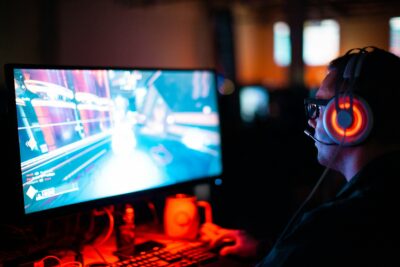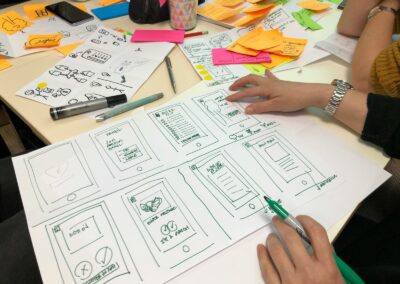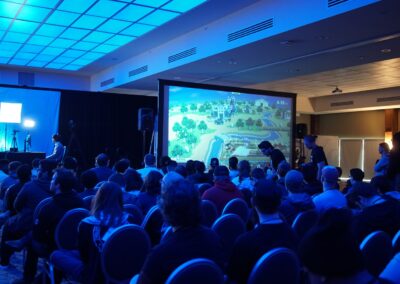Transforming Education through Game Design Principles
Introduction to Game Design in Educational Settings
Applying game design principles in educational settings can create engaging and interactive learning experiences for students. These principles, rooted in creating compelling and enjoyable games, are increasingly being used to make education more appealing and effective. By incorporating elements such as challenges, rewards, and immersive storytelling, educators can enhance student motivation and participation, leading to better learning outcomes.
In regions like Saudi Arabia and the UAE, where educational innovation is a key priority, the integration of game design principles can significantly transform the learning landscape. Schools and universities in Riyadh and Dubai are already exploring these innovative approaches to make learning more dynamic and engaging. By using game-based learning strategies, educators can cater to the diverse needs of students, making education more inclusive and effective.
Moreover, the incorporation of game design principles helps in creating a learning environment that promotes active participation. Instead of passively consuming information, students engage with the content through interactive activities and problem-solving tasks. This hands-on approach not only makes learning fun but also helps in the retention and application of knowledge. By fostering a sense of achievement and progress, game-based learning can inspire students to take ownership of their education and strive for excellence.
Creating Interactive Learning Environments
One of the primary ways game design principles can be applied in education is through the creation of interactive learning environments. These environments leverage technology such as virtual reality (VR), augmented reality (AR), and the Metaverse to create immersive and engaging experiences. For example, students can participate in virtual simulations of historical events, explore complex scientific phenomena, or engage in interactive math challenges that adapt to their skill level.
In Saudi Arabia and the UAE, where technological advancement is a cornerstone of educational reform, interactive learning environments can play a crucial role in achieving educational goals. Schools in Riyadh and Dubai can use VR and AR to provide students with experiences that would be impossible or impractical in a traditional classroom setting. For instance, students can take virtual field trips to ancient civilizations, conduct virtual chemistry experiments, or even participate in global competitions through gamified learning platforms.
Additionally, these interactive environments can incorporate elements of gamification, such as leaderboards, badges, and progress tracking, to motivate students. By rewarding effort and achievement, gamification can help maintain student interest and encourage continuous learning. This approach aligns with the broader educational strategies in Saudi Arabia and the UAE, which aim to cultivate a culture of innovation, critical thinking, and lifelong learning.
Implementing Game-Based Learning Strategies
To effectively implement game-based learning strategies, educational institutions need to focus on several key aspects. First, it is essential to align game-based activities with curriculum standards and learning objectives. This ensures that the educational content remains relevant and meaningful, helping students achieve academic success while enjoying the learning process.
In Riyadh and Dubai, educators can collaborate with game designers and subject matter experts to create educational games that are both engaging and pedagogically sound. These collaborations can result in the development of high-quality educational games that cater to various subjects and grade levels. For example, a game designed to teach biology could involve students in a virtual ecosystem where they must balance the needs of different species, learning about interdependence and environmental science in the process.
Second, it is crucial to provide adequate training and support for teachers to effectively integrate game-based learning into their classrooms. Teachers need to be familiar with the game mechanics, understand how to facilitate gameplay, and know how to assess student performance within the game context. Professional development programs and workshops can help teachers acquire the necessary skills and confidence to use game-based learning tools effectively.
Finally, leveraging data and analytics is vital for assessing the impact of game-based learning. Advanced analytics can provide insights into student performance, engagement levels, and learning progress. By analyzing this data, educators can identify areas where students may need additional support, adjust game difficulty to match skill levels, and refine game-based learning strategies to maximize educational outcomes.
Strategic Implications for Business and Education in the Middle East
Driving Educational Innovation in Saudi Arabia and UAE
The application of game design principles in education has significant strategic implications for educational innovation in Saudi Arabia and the UAE. These nations have made substantial investments in advanced technologies and are committed to fostering environments conducive to innovation. By integrating game-based learning strategies, they can enhance their educational systems and prepare students for the demands of the modern workforce.
In Riyadh, initiatives such as the National Transformation Program and Vision 2030 highlight the country’s commitment to technological advancement and educational excellence. Implementing game-based learning aligns perfectly with these goals, offering a pathway to developing new educational models and creating high-tech learning experiences. By leveraging game design principles, Riyadh can attract global talent and investment, solidifying its position as a hub of educational innovation.
Similarly, Dubai’s futuristic vision and ambitious projects make it an ideal candidate for the adoption of game-based learning. The Dubai Future Foundation and other forward-thinking organizations are already exploring the potential of these technologies. By implementing game-based learning strategies, Dubai can enhance its educational offerings and drive economic growth, positioning itself as a global leader in educational innovation.
Integrating AI and Blockchain in Game-Based Learning
The intersection of game-based learning with AI and blockchain presents exciting possibilities for educational advancement and business innovation. These technologies, when combined, can create powerful synergies that drive unprecedented levels of efficiency, security, and functionality. For educational institutions in Saudi Arabia and the UAE, this convergence offers a unique opportunity to stay ahead of the curve and maintain a competitive edge in the global education market.
AI can significantly enhance the capabilities of game-based learning by providing advanced algorithms and machine learning techniques to optimize educational processes. This integration can lead to more intelligent and adaptive games, capable of handling complex tasks with greater precision and speed. For example, AI-powered educational games can provide real-time feedback and personalized learning paths, enabling students to learn at their own pace and according to their individual needs.
Blockchain technology, known for its robust security features, can complement game-based learning by providing secure and transparent frameworks for data transactions. This combination can be particularly beneficial in sectors such as education, where data integrity and security are paramount. By leveraging blockchain-enabled game-based learning systems, educational institutions can ensure the reliability and confidentiality of student data, fostering trust and confidence among stakeholders.
Embracing Executive Coaching Services for Educational Leaders
To successfully implement game-based learning and navigate the complexities of technological transformation, educational leaders in Saudi Arabia and the UAE can benefit from executive coaching services. Executive coaching provides personalized support and guidance to leaders, helping them develop the skills and strategies needed to drive innovation and achieve organizational goals. By investing in executive coaching, educational institutions can ensure that their leaders are well-prepared to lead the transition to game-based learning and other advanced technologies.
Executive coaching can help educational leaders in Riyadh and Dubai develop a clear vision for the future, align stakeholders with strategic goals, and foster a culture of continuous improvement. Through one-on-one coaching sessions, leaders can gain insights into best practices for implementing game-based learning, managing change, and overcoming resistance. This tailored approach ensures that leaders have the confidence and competence to navigate the challenges of educational innovation.
Moreover, executive coaching can enhance leadership and management skills, critical for driving the successful adoption of game-based learning. Leaders can learn how to effectively communicate the benefits of game-based learning to their teams, build support for new initiatives, and create a collaborative environment that encourages innovation. By strengthening leadership capabilities, executive coaching can help educational institutions in Saudi Arabia and the UAE achieve long-term success and sustainability.
Conclusion
In conclusion, the application of game design principles in educational settings offers significant benefits for creating engaging and interactive learning experiences. For educational institutions in Saudi Arabia and the UAE, embracing game-based learning can drive educational innovation, enhance student outcomes, and prepare students for the future of work. By integrating game-based learning with other emerging technologies such as AI, blockchain, and the Metaverse, these nations can position themselves as global leaders in educational advancement and business success. The journey towards this future requires strategic investments, effective leadership, and a commitment to continuous learning and adaptation, ensuring that the full potential of game-based learning is realized.
#GameDesign #EducationalTechnology #InteractiveLearning #SaudiArabia #UAE #ArtificialIntelligence #Blockchain #Metaverse #ExecutiveCoaching #GenerativeAI #Riyadh #Dubai #EducationalSuccess #LeadershipSkills #ProjectManagement























